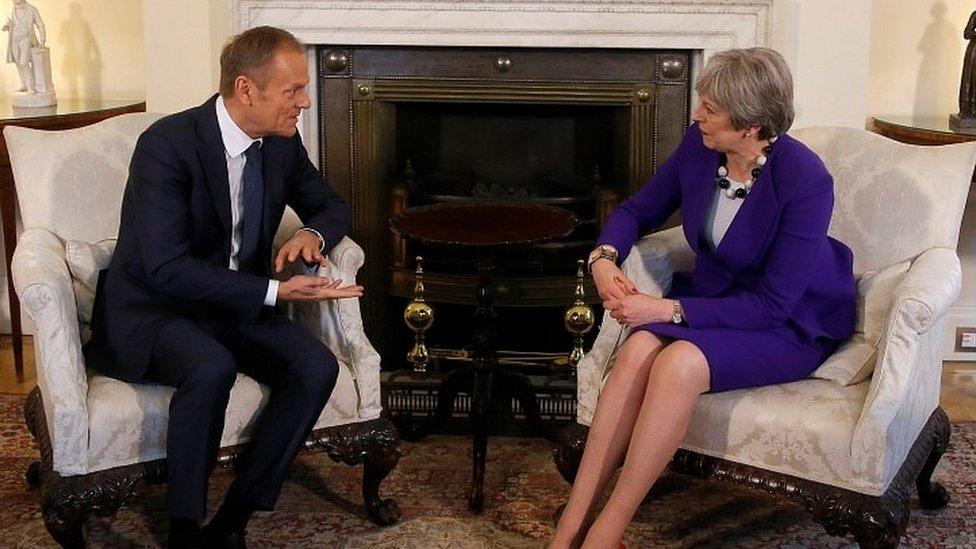A conversation to be had over the shape of Brexit
- Published

Donald Tusk does a good turn in press conferences, delighting headline writers by channelling song lyrics, making dramatic pauses. He, like his European Council colleagues, is a pro.
Even when he is saying something positive about the Brexit negotiations, he manages to convey his personal sadness about the fact the UK has decided to leave with a rather hang dog expression.
Today therefore, don't be surprised that the headlines out of his press conference to mark the publication of the EU's negotiating guidelines for our future trade relationship with them after Brexit are tough for the UK, his expressions hard reading for the government, and the guidelines themselves showing big gaps between the two sides as, to use his phrase today, we are "drifting apart".
The guidelines include, therefore, what the EU side would see as a reality check for the UK. In Brussels' view, there are, as one insider put it, "some vestiges of la la land" in the UK's position.
Today's paper demonstrates how sceptical the EU 27 is, for example, about the UK's hope to choose to stay in some European agencies.
Again, Mr Tusk has said that the UK's overall hope to pick and choose bits of the European apparatus is a non-starter. But before the next formal round of negotiations have begun it would be a genuine shock if he were to say anything else.
On the UK side, the EU has what one insider suggested were "significant' cojones", to suggest for example that the EU retains fishing rights in UK waters. And while not exactly jumping for joy, nor is the government in meltdown over the EU's opening gambit.
The details of the guidelines are here, complete with Donald Tusk's warnings.
But is this a giant two fingers to Theresa May's entire approach that really changes things for the negotiations? Have they today completely torn up the Mansion House speech?
There are significant differences of course, and I'm not suggesting for one second that the way forward is clear. But no one in government will be hugely surprised by the publication today, nor do they believe that it is time to run up the white flag.
In fact, the two sides notionally agree that they are both looking for an ambitious trade deal. Having repeatedly ruled out staying in the Single Market or the Customs Union, that is what the prime minister says she wants. And the EU has said it is willing to talk on the basis of there being no tariffs or quotas either.
Back in the depths of the referendum campaign, that would have seemed like quite a prize. And crucially, the draft guidelines hold out a small promise of room for manoeuvre, saying "if the UK positions were to evolve, the EU would be prepared to reconsider its offer".
In the coming months that may prove the most important paragraph of all. If the UK is willing to compromise, well the EU might have a rethink too.
The document may well be a reminder that it's the UK that will have to do most of the budging, but the draft guidelines do suggestion there is at least a conversation to be had.